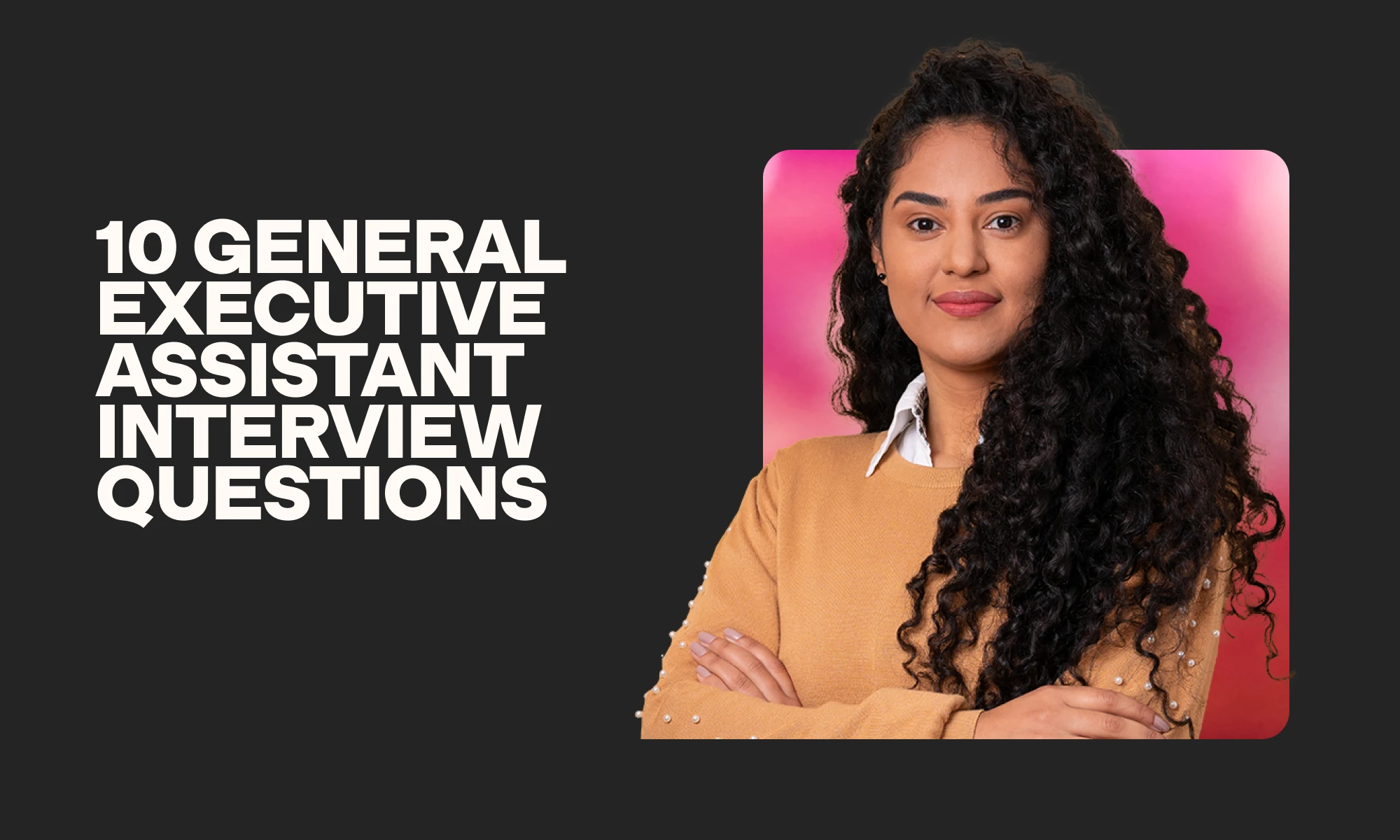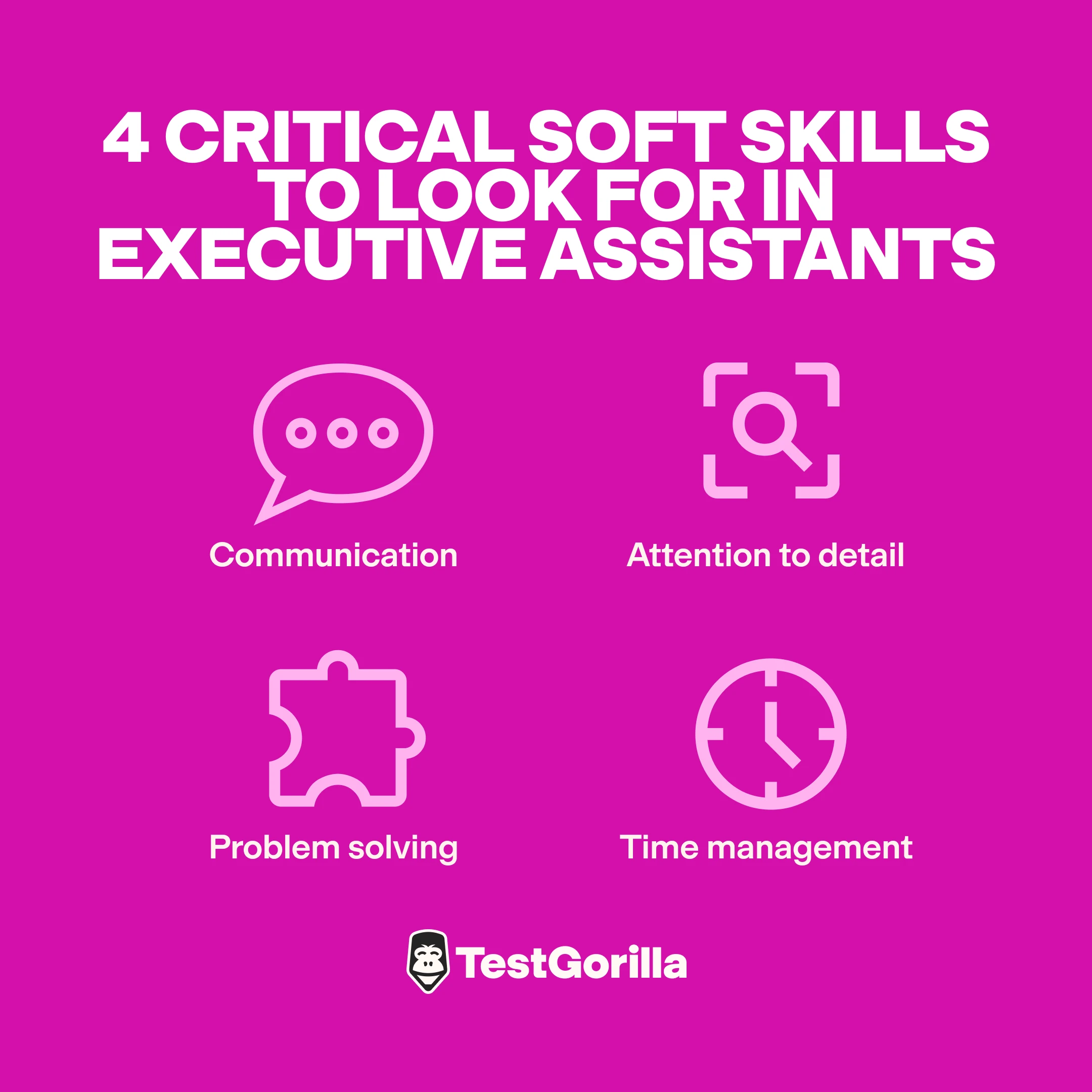38 executive assistant interview questions
Finding and hiring the right executive assistant is challenging: Since they’ll represent your organization, you must make sure they have the right executive assistant skills for the role.
Two things that can make the hiring process more efficient, objective, and bias-free are skills testing and conducting structured interviews, featuring the right executive assistant interview questions.
And if you need a comprehensive list of questions to make the interviewing process easier and more manageable, we’ve got you covered.
Here are 38 executive assistant interview questions to ask your candidates, along with sample answers to 20 of them.
Table of contents
- 10 general executive assistant interview questions
- 5 general executive assistant interview questions and answers
- 10 executive assistant interview questions related to soft skills
- 5 executive interview questions and answers related to soft skills
- 9 executive assistant interview questions related to hard skills
- 5 executive interview questions and answers related to hard skills
- 9 situational executive assistant interview questions
- 5 situational executive assistant interview questions and answers
- 4 critical soft skills to look for in executive assistants
- Hire a top executive assistant with our list of interview questions
10 general executive assistant interview questions
This section features 10 general executive assistant interview questions you can ask candidates to understand if their experiences, skills, and career ambitions align with your executive assistant job description and the role’s requirements.
Pro tip: Dig into our detailed guide on what to pay an executive assistant before you get started.
In which work environment are you most productive and why?
Why did you choose this career?
Which hard skills do executive assistants need to be successful?
Which soft skills do executive assistants need to be successful?
Describe a previous role in which you gained valuable experience.
Which words would you use to describe the role of an executive assistant and why?
How do you stay motivated to perform at your best?
Describe your career so far.
Which is the most challenging part of being an executive assistant?
Which training opportunities would you like to pursue in the next few months or years?
5 general executive assistant interview questions and answers
Here are five general executive assistant interview questions and answers you should listen for when interviewing your potential next hire.
1. Which hard skills do executive assistants need to be successful?
Candidates may explain that computer skills such as knowledge of Microsoft Office (and especially Microsoft Excel and Microsoft Word) are essential hard skills for an executive assistant.
They may also mention that knowledge of customer relationship management (CRM) tools such as HubSpot CRM or Salesforce CRM can make the complex responsibilities of executive assistants easier.
2. Which soft skills do executive assistants need to be successful?
Do your candidates know which soft skills are vital for them to succeed in this role?
Some examples of soft skills that are critical for executive assistants include:
3. Describe a previous role in which you gained valuable executive assistant experience.
Your candidates may mention roles in which they received training and were able to grow in the position.
They may describe a job where they received additional responsibilities, such as handling confidential information or booking travel arrangements. Look for responses that indicate an overall preparedness for your open role’s responsibilities or a willingness to learn and adapt.
4. How do you stay motivated to perform at your best?
Some values that can help executive assistants stay motivated to perform at their best include curiosity and adaptability. Your candidates may also outline a few methods to remain focused and stay up-to-date with new tools and approaches, for example by keeping track of new task management software or developing new computer skills.
5. Which words would you use to describe the role of an executive assistant role and why?
Candidates may use many different words when answering this question. Look for words that reflect your organization’s values and show that the candidate intends to assimilate into the role.
The best insights on HR and recruitment, delivered to your inbox.
Biweekly updates. No spam. Unsubscribe any time.
10 executive assistant interview questions related to soft skills
This section features 10 interview questions you can ask your candidates to find out more about their soft skills.
Do you consider yourself a leader or someone who can follow instructions well?
Do you prefer working as part of a team or independently?
How do you prioritize tasks?
Which methods do you use to communicate clearly with executives?
Which methods do you use to handle different tasks and meet deadlines?
Which is more critical: meeting deadlines or delivering good quality?
Which methods do you use to handle stressful scenarios in the workplace?
How have you handled workplace conflicts between team members in the past?
How would your current boss rate your time management skills from 1 to 10, and why?
Tell me more about a time you have delivered work ahead of schedule and the methods you used to do that.
5 executive interview questions and answers related to soft skills
Below you’ll see five sample answers to the most crucial executive assistant interview questions related to soft skills.
They’ll help you identify top talent and make the right hiring choices.
1. Which methods do you use to handle different tasks and meet deadlines?
Test your applicants’ time management skills by asking them this question. Candidates may respond by explaining that calendar management is a critical method for handling different tasks and meeting deadlines. They may work with to-do lists, reminders, or time blocks when they can focus on each task, such as checking emails.
2. Do you consider yourself a leader or someone who can follow instructions well?
Part of the executive assistant role you’re hiring for may include being the face of the organization, representing executive staff, and following instructions.
Look for candidates who have both leadership skills and the ability to follow instructions. Consider candidates whose leadership skills align with your organization or who are willing to learn the leadership skills for the role.
3. Do you prefer working as part of a team or independently?
Applicants should demonstrate that they can work independently for your organization since executive assistants often need to work on projects alone. They may mention specific skills that help them work alone, such as task management and time management skills.
They may also have superior skills for working in a team, such as conflict resolution and communication skills. These are also crucial for the role.
4. How do you prioritize tasks?
In response to this question, do your applicants know how to prioritize the most urgent tasks? Are they aware that an updated to-do list, strong calendar management skills, or task management software tools can help? Listen for responses that show that applicants won’t hesitate to speak with executives and determine which tasks are the most urgent.
5. Which methods do you use to communicate clearly with executives?
When answering this question, active listening and speaking clearly and concisely are two communication methods candidates may mention. You should also look for candidates who ask additional questions when they are unsure of the instructions provided.
9 executive assistant interview questions related to hard skills
Learn more about your executive assistant candidates’ hard skills by asking them some of the nine executive assistant interview questions listed in this section.
What are your strongest computer skills?
Which computer skills do you need to work on?
Do you have any experience with Microsoft Office and Windows?
How would your current boss rate your phone etiquette skills?
Which approaches do you use when learning to use new software?
How do you maintain files and keep them organized?
How do you handle conflicting ideas when working on team projects?
Which software makes your role as an executive assistant easier?
Which processes do you use to organize a travel schedule?
5 executive interview questions and answers related to hard skills
Below, you’ll see the responses to five of the most critical executive interview questions related to hard skills, which you can compare to your applicants’ answers.
1. Do you have any experience with Microsoft Office and Windows?
Microsoft Office skills are often critical for an executive assistant role – if that’s the case for your organization, look for applicants who have used Microsoft Office extensively.
For example, candidates should have excellent typing skills, know Microsoft Word inside and out, or also know how to use Excel spreadsheets efficiently. Experience with Microsoft PowerPoint or Outlook can also be a huge plus.
2. What are your strongest computer skills?
Digital calendar management, Microsoft Office, and data entry skills are some of the computer skills your candidates may mention.
If applicants don’t have the exact skills you’re looking for, consider candidates who are keen to learn and quickly get up to speed when they join your organization.
3. Which processes do you use to organize a travel schedule?
Ask candidates this question to test their planning skills. Responses may include communicating with executives to clarify itinerary requirements, using travel management tools to organize the itinerary, considering alternative travel arrangements if there are any delays, and making expense reporting simpler.
4. How would your current boss rate your phone etiquette skills?
Candidates should have excellent phone etiquette, because they’ll be a key representative of your organization. Look for candidates with top phone etiquette skills and examples to prove it. For example, can your candidates screen calls, take precise messages, transfer calls, and handle challenging callers tactfully?
5. Which computer skills do you need to improve?
When responding to this question, candidates should indicate that they are in the process of improving the skills they are currently lacking. For example, if they are unsure how to use Excel spreadsheets, look for applicants who are actively taking measures to learn.
9 situational executive assistant interview questions
Learn how your candidates respond to challenging situations in a professional environment with these nine situational executive assistant interview questions.
How would you handle confidential information if another executive asked about it?
If a client demands to speak with a busy executive, what would you do?
Describe a time you needed to quickly organize a conference or an event.
Describe a time you handled a big project that required a lot of planning.
How would you respond if an executive gave you constructive criticism?
Have you ever had to assume the role of a spokesperson and tell a client “no”?
Have you ever had to reschedule several meetings at a time? Which skills did you use to do it?
Describe a time you demonstrated initiative in a previous role.
If you don’t have enough work, how would you handle this?
5 situational executive assistant interview questions and answers
Here are five of the above situational executive assistant interview questions, along with sample answers that will help guide you during the interview phase.
1. How would you handle confidential information if another executive asked about it?
Your applicants should know that keeping information private is important, but they may need to share part of the details in certain situations, for example when communicating with other executives from the same company.
Do your candidates know that handling confidential information doesn’t always require complete non-disclosure? Can they assess circumstances and determine when there are some exceptions to the total non-disclosure of confidential information?
2. Have you ever had to assume the role of a spokesperson and tell a client “no”?
Since applicants may have to say “no” as a spokesperson for an executive at some stage, look for candidates who can appease clients and use tact.
Applicants must look to understand why the client made the request and offer some alternative suggestions to assist them.
3. Have you ever had to reschedule several meetings at once? Which skills did you use to do it?
Sometimes it’s necessary to reschedule multiple meetings at once, and it’ll be down to the executive assistant to do this. Do your candidates have the right planning skills to reorganize the schedule? Can they use their task management skills to handle the rescheduling process, even if the changes occur at the last minute?
4. How would you respond if an executive gave you constructive criticism?
Knowing how to handle constructive criticism is an important element to learning and improving essential skills. Look for candidates who see constructive criticism as an opportunity to develop and perfect their executive assistant skills.
5. If a client demands to speak with a busy executive, what would you do?
Can your candidates handle the challenge of accommodating a demanding client? Can they take a message from the client while reassuring them that the executive will receive their message? Candidates may also offer the client alternative responses, so look for applicants who can use tact and creativity to appease demanding clients.
4 critical soft skills to look for in executive assistants
Just before we wrap up this article, here are four essential skills you should look for when hiring executive assistants for your organization.
1. Communication skills
Do your candidates have the right communication skills to become your next executive assistant? Verbal communication skills are crucial for executive assistant roles, as are active listening skills. These skills are required to communicate with internal stakeholders and with clients to clarify the requirements of projects.
2. Time-management skills
Time-management skills are essential for executive assistants, helping them arrange schedules and handle projects and tasks while meeting deadlines. Can your executive assistant show that they have the right time-management skills for managing projects?
3. Attention to detail
No matter how small the details, paying attention to each one is vital for executive assistant roles, particularly when scheduling meetings or planning a travel itinerary. Do your candidates have the suitable attention to detail skills to handle the essential responsibilities of the executive assistant role?
4. Problem-solving skills
Your new hire will have plenty of problems to solve in their new role, so problem-solving skills are essential. For example, they may have to handle demanding clients. Do your candidates have the right problem-solving skills to address complex challenges as your executive assistant?
Hire a top executive assistant with our list of interview questions
Even though hiring an exceptional executive assistant might seem like a daunting task, nothing’s stopping you now! You have a comprehensive list of executive assistant interview questions, and you can also use the best skills-testing platform to make hiring easier.
Dive into your hiring process with a skills assessment of up to five tests to select the best candidates to invite to an interview. When you’re ready, put our interview questions to use to determine whether your candidates have the values, work ethic, and exemplary behavior to join your team.
Hiring a top executive assistant doesn’t have to be difficult, if you’re equipped with the right interview questions and skills tests.
With TestGorilla, you’ll find the recruitment process to be simpler, faster, and much more effective. Get started for free today and start making better hiring decisions, faster and bias-free.
You've scrolled this far
Why not try TestGorilla for free, and see what happens when you put skills first.























